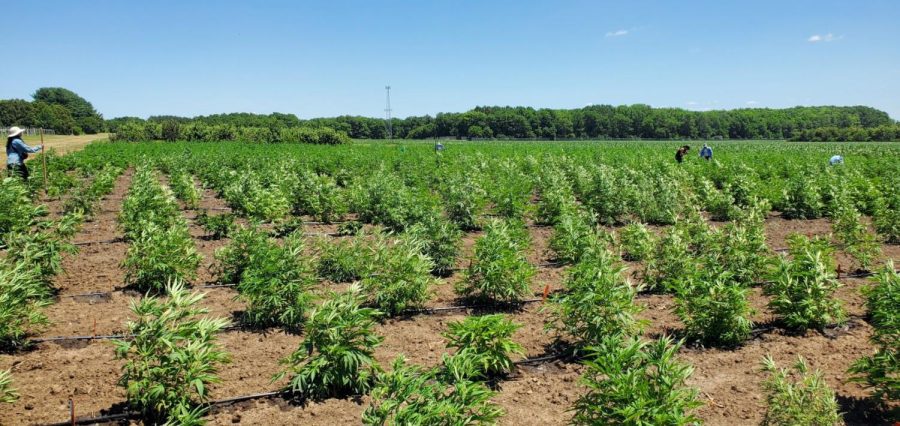Cannabis certification buds student interest
Photo courtesy of Jeffrey Taylor
Cannabis plants located in the University’s fruit research farm on Oct. 12, 2022.
Oct 13, 2022
Parker Johnson, sophomore in Division of General Studies, said people often don’t believe him when they hear what he’s studying.
Johnson is working toward earning a Cannabis Production and Management Certification offered online by the Crop Sciences Department in the College of ACES.
“They’re like, ‘No way that exists — that’s not real,’ and I’m like, ‘Yeah, yeah it is,’” Johnson said.
Johnson’s reasons for working toward the certification are both personal and career oriented. He said he also hopes to use the certification as a résumé builder.
“It’s a big, growing industry,” Johnson said. “And a lot of the big jobs that I’ve seen that involve (cannabis) make over ($200,000) a year.”
Johnson said he sees a possible venture into the cannabis industry as a way to “help people out and get paid while doing it.”
The certification consists of classes that familiarize students with the ins and outs of the cannabis plant.
According to the program’s website, the certification helps “students become equipped with knowledge for cannabis indoor, outdoor and large-scale field production; classification of subspecies and varieties, biology … and harvesting of target compounds and products.”
Nondegree seeking students from outside the University are also able to take the classes online.
DoKyoung Lee, professor in ACES, is in charge of the certification program and teaches a few of the program’s courses. Lee said he’s “not really teaching about the marijuana side” in classes.
“We’re talking about just how to grow the plant,” Lee said. “Once you know the basic biology and management practice, you can go either way — for marijuana or hemp.”
Lee said the important part of the certification is understanding the basic biology and the “in-principle growing of the cannabis plant.”
Due to federal rules that the University follows regarding cannabis, Lee has a license for growing nonpsychoactive hemp rather than marijuana.
“I can’t even touch the marijuana plant,” Lee said. “As soon as I know my plant is marijuana, I have to destroy it. In this campus, we follow the federal rule.”
Lee said understanding these rules is vital.
“A lot of times, students think recreational use is legal in this country, but that doesn’t mean you can grow the plant,” Lee said. “In terms of marijuana, every state has different rules, and that’s what I really emphasize in the class, because you really need to understand.”
Marijuana, the form of the cannabis plant that is reached when it is measured to have more than a certain amount of the psychoactive chemical agent THC, was legalized in Illinois in 2020.
Jeffrey Taylor, senior in Engineering and treasurer of the Hemp Club at the University, said he earned his certification last year.
“As someone coming out of college I think (the certification) … really gives you a leg up when it comes to working in the industry,” Taylor said.
Legalization in Illinois ushered in a burgeoning industry that is expected to employ up to 63,000 workers in the state by 2025 and resulted in $445 million in state tax revenue for the 2022 fiscal year.
“I’m a senior now, so I’m applying to a lot of full-time jobs,” Taylor said. “And as someone coming out of college I think that (the certification) … really gives you a leg up when it comes to working in the industry.”
Get The Daily Illini in your inbox!
Taylor said his goal is to go into indoor cultivation of cannabis, using his computer science background to implement automation in “super-controlled environments” like that of an indoor greenhouse.
Taylor also said that under University’s rules, the Hemp Club cannot show photos of the cannabis flower to people under the age of 18, meaning that the club, which has a goal of building a “professional cannabis community on campus,” has a unique 18-and-over age requirement for its members.
Taylor said seeing his sister with epilepsy react positively to the first FDA-approved cannabis drug drew him to cannabis research.
“I was like, ‘There’s a lot of work here that’s not done yet,’” Taylor said. “(The cannabis industry) keeps me connected to nature, while still being able to do technologically advanced things.”






